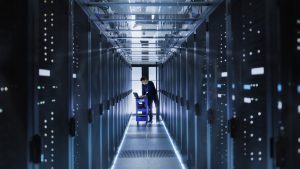About 20 years ago, Marcus Shipley was in charge of the rollout of a large application project. It was a long, involved job but in the end, he was proud of the job he’d done.
For his next assignment, his boss moved him to the data center. On his first day, a data center engineer gave him a tour of the place, which was all nice and orderly, like a data center tends to be. Except, that is, for a cluster of equipment off by itself. Shipley asked what that was and the engineer told him it was the equipment required to run the application Shipley had just rolled out. As it turns out, the servers, storage and other equipment Shipley had chosen was different from everything else the data center was using.
“And we’re going to be running this for the next 15 to 20 years,” the engineer said. “Welcome to the data center.”
“My perspective changed immediately,” Shipley told his audience at the recent Data Center World conference in Orlando, where he delivered a morning keynote address. Now CIO for CHE Trinity Health, Shipley said the 18 months he spent in that data center were the single best growth period of his career – and it’s all attributed to the different perspective he gained.
CHE Trinity is a massive healthcare organization, with some 82 hospitals, 770 clinics and $13.3 billion in revenue. Shipley, who described himself as a “lifelong applications guy,” has been serving as CIO since April 2012.
His talk was about the convergence that’s going on all around us, how “change is actually our new normal,” and how IT needs to respond. Along the way, he threw in a healthy dose of advice about trying to see issues from the other guy’s perspective, in order to better inform your own.
With respect to convergence, he cited the movement to “everything as a service,” be it platforms, applications and infrastructure. At the same time, we’re seeing the digitization of just about everything – and it’s more than marketing hype, he said.
He sees examples in the hospital setting where he works, where everything in the hospital room is connected and data is stored in electronic medical records systems. Even when patients go home, often they’re still connected to systems that monitor various vital signs. “That’s the Internet of Everything,” he said.
But it all comes together in a data center somewhere, he noted, so it’s incumbent on data center personnel to become part of the conversation about business priorities and the choices that get made. Once equipment winds up in a data center, it’s no longer a PowerPoint presentation or a concept on a white board, he said. “It’s real and it’s going to be here for a while.”
To align multiple perspectives, he supports developing an enterprise architecture that aligns business, application and technology viewpoints, including the data center. Data center personnel should establish tenets of the technology architecture that “swim up stream” and influence the business strategy, he said. For the past couple of decades, he argues that hasn’t been happening.
“That’s the opportunity for those in this room,” he said. During the Q&A after his talk, one attendee pointed out that it’s often a challenge for data center folks to get invited to the meetings they should be attending where those conversations are happening.
“Don’t wait for them to come to you, seek them out,” Shipley advised, noting the enterprise architecture construct is a good tool for bringing the sides together.



